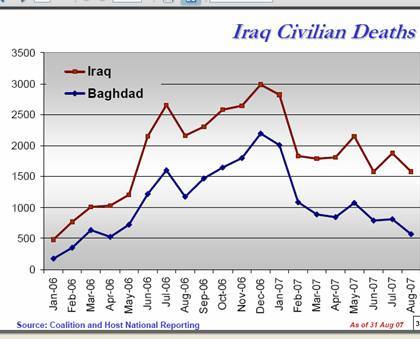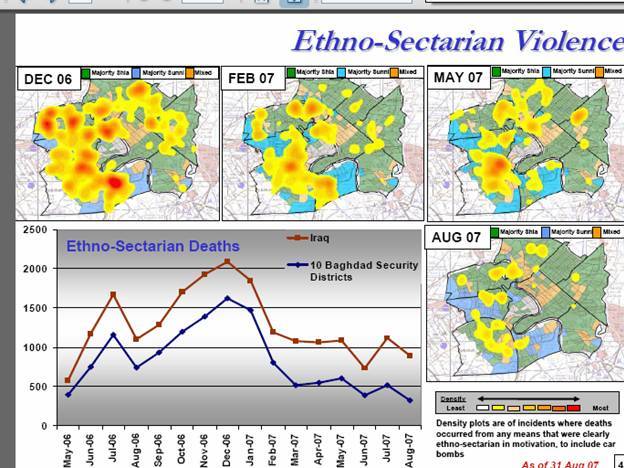Ambassador Crocker argued that progress is being made on the political front. Unfortunately, this does not seem to be the case. Iraqi leaders are still more tied to their sectarian loyalties than to the central government and have continued to pursue sectarian agendas. Moreover, the GAO and NIE both agreed that there is little opportunity for significant changes in the political situation in the coming months. Finally, hollow face saving agreements by the Iraqi government, such as the one cited by Ambassador Crocker, have been tried before. They have continuously failed because a lack of support within parliament, or a genuine commitment to overcome sectarian differences.
Crocker: Is the collective national leadership of Iraq ready to prioritize Iraq over sectarian and community interests? Can and will they come to agreement about what sort of Iraq they want?
The National Intelligence Estimate concludes that the Iraqi Government is going in the wrong direction, but there is no viable alternative to Prime Minister Maliki. “The IC assesses that the Iraqi Government will become more precarious over the next six to 12 months because of criticism by other members of the major Shi’a coalition (the Unified Iraqi Alliance, UIA), Grand Ayatollah Sistani, and other Sunni and Kurdish parties. Divisions between Maliki and the Sadrists have increased, and Shi’a factions have explored alternative coalitions aimed at constraining Maliki. The strains of the security situation and absence of key leaders have stalled internal political debates, slowed national decision-making, and increased Maliki’s vulnerability to alternative coalitions. We judge that Maliki will continue to benefit from recognition among Shi’a leaders that searching for a replacement could paralyze the government.” [National Intelligence Estimate, 8/23/07]
The Iraqi government is making little progress and has met only one of eight political benchmarks. The Iraqi government met one of eight legislative benchmarks: the rights of minority political parties in Iraq’s legislature are protected. The government has not enacted legislation on de-Ba’athification, oil revenue sharing, provincial elections, amnesty, and militia disarmament. [GAO, 9/4/07]
Members of the Iraqi Government Manipulate the Security Forces for Their Own Sectarian Purposes Shi’a supporters of Muqtada al Sadr have appointed Mahdi militia members to leadership positions in the Iraqi army. “In one of the more troubling examples of the relationship between the militia and Iraqi government, the Defense Ministry in January authorized lawmaker Baha Araji, a Sadr loyalist, to form a plainclothes army unit to patrol the Shiite district of Kadhimiya. The Baha Araji Company was a 300-man element of plainclothes Jaish al Mahdi operatives “that have subsequently been put in Iraqi army uniforms,” said Lt. Col. Steven Miska of the 1st Infantry Division. “Nobody in the Iraqi army chain of command wanted those guys in uniform. It was a political decision.” The Defense Ministry disbanded the unit in May. The commander became the head of a new battalion that included many of his former troops. [LA Times, 8/16/07]
The Prime Minister’s office has played a leading role in the arrest and removal of senior army and national police officers. At least 16 Iraqi Army and National Police commanders (nine of whom are Sunni Arab) have been fired, detained, or pressured to resign. According to Iraq Assistance Group commander Brig. Gen. Dana Pittard, “Their only crimes or offenses were [that] they were successful.” For example, two high-ranking National Police officers described as “professional, non-sectarian, and focused on gaining [the] support of the populace” and “assessed as combating militia influences” were respectively detained and replaced. Col. Ehrich Rose, the chief advisor of the 4th Iraqi Army Division and veteran of previous advisory efforts, remarked, “the politicization of [the Iraqi Army’s] officer corps is the worst I’ve ever seen.” [Washington Post, 4/30/07]
U.S. general in charge of training Iraqis says the largest challenge is finding leaders free of sectarian loyalties. Lt. Gen. James M. Dubik said non-sectarianism was “much harder” to instill than teaching soldiers to fight. [NY Times, 7/29/07]
Crocker: After weeks of Preparatory work and many days of intensive meetings, Iraq’s five most prominent national leaders from the three major communities issued a communiqué on August 26 that noted agreement on draft legislation dealing with de-baathification.
The NIE found that the current course is unlikely to lead to major changes in either the political or security situation. “Broadly accepted political compromises required for sustained security, long-term political progress, and economic development are unlikely to emerge unless there is a fundamental shift in the factors driving Iraqi political and security developments.” [National Intelligence Estimate, 8/23/07]
The NIE found that Sunnis are incapable of delivering on national reconciliation. “The Sunni Arab community remains politically fragmented, and we see no prospective leaders that might engage in meaningful dialogue and deliver on national agreements.” [National Intelligence Estimate, 8/23/07]
Despite a tentative agreement by Iraqi leaders on key issues, the accord is not enough to lure Sunnis back into the government. Iraq’s top five political leaders announced an agreement late last month to release thousands of detainees being held without charge and to reform the laws that have kept thousands of member’s Saddam Hussein’s Baath Party out of government jobs. The agreement to ease restrictions on former Baath party members, could face a stiff battle in Iraq’s divided parliament. Many Shi’a and Kurdish lawmakers have objected to allowing Sunni ex-Baathists into jobs related to national security and are nervous they could once again regain dominance in the government. According to an adviser to Sunni Vice President Tariq al-Hashimi, "We left the government and we are not going back ever unless they meet all of the demands. [Washington Post, 8/27/07, Reuters, 8/27/07]
These types of agreements on de-Baathification have been made before but they cannot be followed through on because of objections in parliament. On March 26, a draft law titled the Reconciliation and Accountability Law was circulated by Prime Minister Maliki’s office. It put a three-month limit on the ability of people to bring lawsuits against former members of the regime after which they would be immune from prosecution, eligible for work in the public sector and would receive pension benefits. The law also weakened the power of the de-Baathification commission which had been used as a platform by the Shi’a government to exact revenge on Sunnis for past wrongs. The law was derailed by Muqtada Al Sadr’s block in parliament and by Ahmed Chalabi. [NY Times, 6/13/07. United Nations]
The Iraqi cabinet approved an amended draft oil law, back in July to try to demonstrate progress before the interim benchmarks report but the agreement turned out to be hollow. The law was pushed through without the support of Sunnis or the Kurdistan Regional Government and faces major opposition in parliament. The oil law is important because it could help bring about national reconciliation by guaranteeing a fair division of oil revenues for Shi’a, Sunnis, and Kurds. Unfortunately, the law was approved by the cabinet while the Sunnis were boycotting the meetings. Muqtada Al Sadr’s party, which represents the largest group of Shi’a, has also objected to the law and the leaders of the Kurdistan Regional Government have not yet seen the final draft. [LA Times, 7/5/07. AP, 7/4/07]
Lawmakers met for the first time since their month long summer break, but it is not immediately clear whether it would be taking up key benchmark legislation demanded by Washington. The session opened with 158 members of 275 present — enough to form quorum, but the agenda was not immediately announced. While parliament was in recess, al-Maliki attempted to break the impasse with major Shiite, Sunni Arab and Kurdish leaders in a high-level meeting just over a week ago. They said they agreed in principle on some issues that the U.S. has set as benchmarks for progress, among them holding provincial elections, releasing prisoners held without charge and changing the law preventing many former members of Saddam Hussein's Baath Party from holding government jobs and elected office. But no details were released and committees must hash out final versions of legislation to be presented to parliament. Iraqi officials have announced similar deals in the past, only to have them fall apart. [AP, 9/04/07]
Crocker: A key challenge for Iraqis now is to link these positive developments in the provinces to the central government in Baghdad
American officers acknowledge that providing support to rebel groups is not new in counterinsurgency warfare and has backfired in the past with these elements turning against the United States. In Afghanistan, the U.S. government armed the Mujahedeen and Osama Bin Laden to fight the Soviets. They later formed Al Qaeda. This tactic has been tried before in the French colonial war in Algeria, the British-led fight against insurgents in Malaya in the early 1950s, and in Vietnam and the effort often backfired, with weapons given to the rebels being turned against the forces providing them. [NY Times, 6/11/07]
Arming Sunnis who oppose the Iraqi national government undermines national reconciliation efforts and further weakens the national government. The U.S. policy of enlisting Sunni militants as allies in the fight against al Qaeda has drawn sharp criticism from the Shi’a prime minister who has threatened to start arming Shi’a militias in response. Sami al-Askari, a key aide to al-Maliki and a member of the prime minister's Dawa Party, said the policy of incorporating one-time Sunni insurgents into the security forces shows Gen. David Petraeus has a "real bias and it bothers the Shi’a." A lawmaker from the al-Sadr bloc, speaking on the condition of anonymity, said al-Maliki has complained to President Bush about the policy of arming Sunnis. "He told Bush that if Petraeus continues doing that, he would arm Shiite militias. Bush told al-Maliki to calm down," according to this parliament member, who said he was told of the exchange by al-Maliki. [Washington Post, 7/28/07]
Sunnis are incapable of delivering on national reconciliation. “The Sunni Arab community remains politically fragmented, and we see no prospective leaders that might engage in meaningful dialogue and deliver on national agreements.” [National Intelligence Estimate, 8/23/07]
By arming Sunni tribal groups and at the same time arming security forces that are primarily Shi’a, the U.S is arming both sides in a civil war. Maj. Gen. Rick Lynch said commanders would face hard decisions in choosing which groups to support. ''This isn't a black and white place,'' he said. ''There are good guys and bad guys and there are groups in between,'' and separating them was a major challenge. According to Lynch, ''[the Sunnis] say, 'We hate you because you are occupiers…but we hate Al Qaeda worse, and we hate [Iraq’s Shi’as] even more.' '' [NY Times, 6/11/07]
Financing and training Sunni tribes hostile to the government contradicts General Petraeus’s own counterinsurgency manual. The United States Counterinsurgency Field Manual, written by General Petraeus, states that “Counterinsurgents should avoid taking sides, when possible. Perceived favoritism can exacerbate civil strife and make counterinsurgents more desirable targets for sectarian violence.” [Counterinsurgency Field Manual, 12/15/06]



